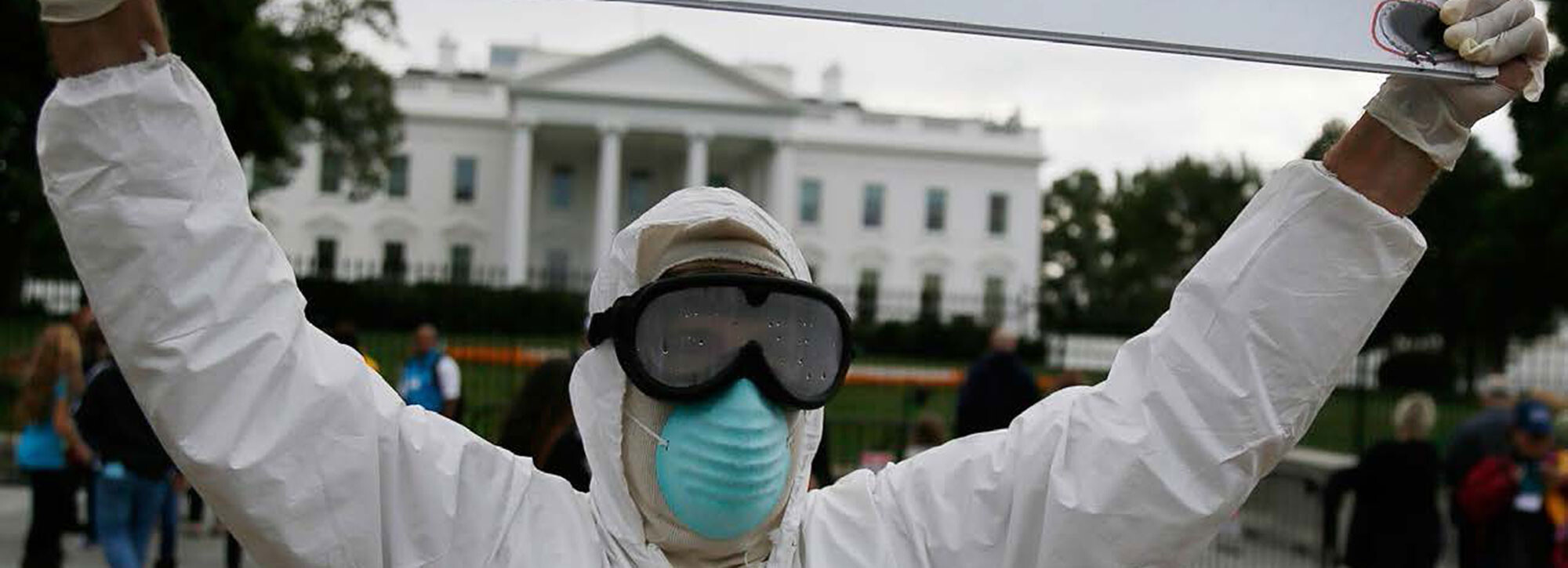In late 2013, an outbreak of Ebola virus disease erupted in West Africa, in Liberia, Sierra Leone, and Guinea. In 2014, due to the delay in the international response to the situation, the outbreak grew into the first epidemic of the disease since the discovery of the virus in 1976. By August of 2014, WHO Director-General Margaret Chan had declared the epidemic a global public health emergency and the outbreak "the largest, most complex and most severe we've ever seen."
In the United States, the Ebola-caused death of Thomas Eric Duncan, a Liberian who was visiting family in Dallas, and the infection of two of his nurses, sparked a massive wave of public anxiety and political overreaction. Politicians, particularly governors in the Northeast, in New York, New Jersey, and Connecticut broke with public health consensus on how best to deal with the virus and ordered mandatory quarantines of health care workers and visitors from West Africa. The media also fanned the flames of hysteria about Ebola, making exaggerated claims about its transmissibility and the possibility of spread in the US.
By December 2014, at least 23 states had announced quarantine and movement restriction policies that exceeded the Center for Disease Control and Prevention (CDC) guidelines. In the most prominent case, New Jersey Governor Chris Christie instituted a mandatory 21-day quarantine policy for all returning health care workers. Kaci Hickox, a Doctors Without Borders nurse who volunteered in Sierra Leone, was held in a tent outside a Newark hospital for three days before being allowed to return to her home state of Maine under an in-home quarantine. In Connecticut, nine people (all symptom-free) were forcibly quarantined in their homes. The exact number of people across the U.S. who were quarantined or otherwise restricted in their movements during the 2014-2015 outbreak is unknown, but a review of media reports found that hundreds of returning aid workers were affected.
Fear, Politics and Ebola
As part of the GHJP Practicum in Spring 2015, a group of Yale students worked in collaboration with ACLU’s Speech, Privacy, and Technology Project, to research and document the state-by-state responses to the Ebola outbreak and to develop a scientific and constitutional analysis of the policies and procedures that were put into place during the 2014-2015 crisis. The group’s research confirmed that the state-imposed quarantines and movement restrictions were not scientifically justified and that various individuals were illegally deprived of their right to due process under the Fourteenth Amendment. In fact, except for Maine, no state that instituted a quarantine policy appears to have complied with the procedural requirements of due process, in which an individual is given proper notice and an opportunity to contest their quarantine. Moreover, only one court had the opportunity to evaluate the legality of an Ebola quarantine, and it found that it was clearly beyond the power of the state to impose. The court concluded that “people are acting out of fear and . . . this fear is not entirely rational.” The full report is available here.
On February 8, 2016, law students working with GHJP and the Jerome N. Frank Legal Services Organization (LSO) at Yale Law School filed a lawsuit against Gov. Daniel P. Malloy Connecticut and the state’s acting and former health commissioners on behalf of residents affected by Connecticut’s Ebola unlawful quarantine policies. The plaintiffs include one current and one former Yale public health student quarantined upon their return from a humanitarian trip to Liberia in fall 2014; a West African family of six that was quarantined in October 2014; the aunt in whose house the family was quarantined and who was required to care for them; a religious leader who travels between churches in West Haven and Liberia and his wife; the Liberian Community Association of Connecticut; and a physician who specializes in emergency medicine and has treated Ebola patients in West Africa. For more information, read the press release here and access court filings here.
